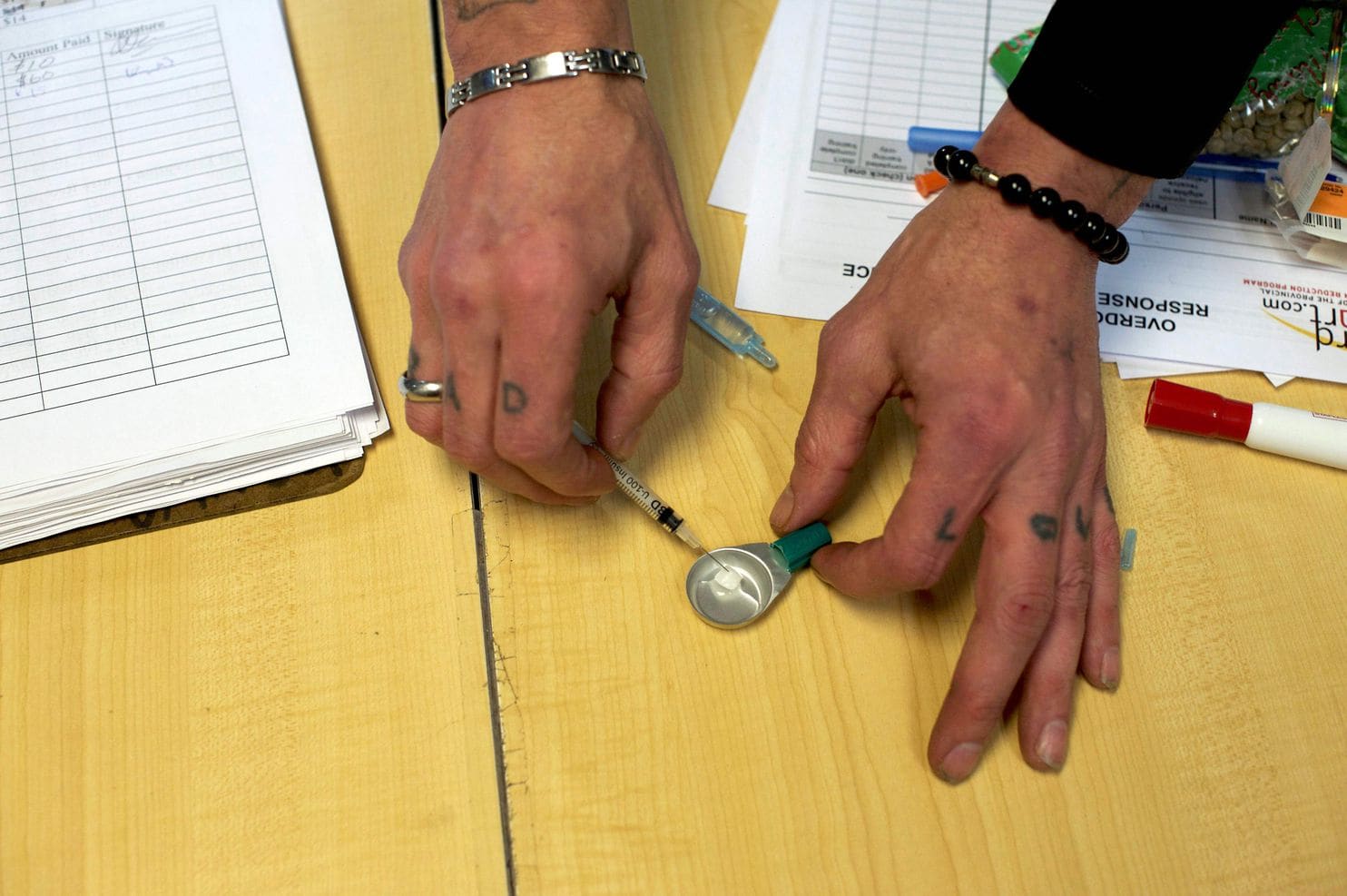
25 May California Assembly approves supervised opioid injection facility, faces federal opposition

In this file photo from 2016, a heroin user illustrates how to draw heroin or fentanyl into a clean syringe at the office of the Vancouver Area Network of Drug Users. (Deborah Jones/AFP/Getty Images)
The California Assembly has passed a bill allowing San Francisco to open a facility where people can use illegal drugs under supervision, one of several local efforts nationwide to curb overdose deaths that has drawn opposition from the federal government.
The bill’s passage comes months after the Department of Justice sued to block a Philadelphia nonprofit organization from opening what is known as a supervised injection facility. Such sites allow people to use illicit drugs, but they also allow medical professionals to closely monitor users and help them immediately in the case of overdoses.
Officials in San Francisco believe opening such a facility is necessary to help alleviate the city’s chronic drug and homelessness problem, which has led to open-air drug use and needles and other drug paraphernalia being strewn on city streets. Mayor London Breed (D) has pushed for the facility to go forward.
“She’s been clear that we have a crisis, an injection crisis, on our streets,” said Jeff Cretan, a spokesman for Breed. “A safe injection site will obviously help not only reduce the needles that are on our sidewalks . . . just as importantly it will provide a space where people can go when they are ready to seek treatment.”
[Obama officials failed to focus as fentanyl burned its way across America]
San Francisco is one of several cities that have vowed to open a supervised injection site despite the federal government saying they are illegal. Mayor Libby Schaaf (D) of neighboring Oakland introduced a resolution to the city council earlier this month asking that the bill paving the way for San Francisco’s site also include Oakland.
City officials in Ithaca, N.Y., Denver, Seattle and New York have expressed interest in opening safe injection facilities, as has a legislative committee in Massachusetts.
The municipalities argue that the facilities would help alleviate the nation’s opioid epidemic, which killed more than 47,000 people in 2017. Most of the deaths have been driven by fentanyl, a powerful synthetic opioid.
The Trump administration argued in the Philadelphia case that opening such a facility would violate federal law under a statute used to prosecute crack houses. Government lawyers say that allowing the use of illegal drugs would exacerbate the nation’s opioid epidemic.
But officials in California say they are not cowed.
The bill passed in a 44 to 26 vote, and it now heads to the state senate, where proponents said they are cautiously optimistic that the bill will pass. Gov. Gavin Newsom (D) has indicated that he would sign a bill allowing such facilities to open. His office did not respond to a request for comment.
[Trump called the opioid epidemic a priority, but fentanyl deaths soar as resources fail to keep pace]
“California legislators tend not to be intimated by the Trump Administration,” said state Sen. Scott Weiner (D). “I don’t view that as resonating in the California leiglsature.”
A similar measure cleared the legislature last year, but was it was vetoed by Gov. Jerry Brown (D).
San Francisco would be a pilot site for the state — officials would gather information and data about how the supervised injection facility functions and whether it can be replicated elsewhere. Weiner said the facilities are necessary because they shift the focus on addiction away from punishment and toward helping drug abusers.
“It’s a health issue, not a criminal issue, and we need to take approaches that are science-based, not fear-based, and we know from experience around the world that safe injection sites work,” he said.
Supervised injection facilities operate in Australia, Canada and Europe. Officials from U.S. cities have visited a large supervised consumption facility in Vancouver, and a smaller one in Toronto.
A Philadelphia delegation led by former city mayor and Pennsylvania Gov. Ed Rendell (D) was among them. Rendell has been a vocal supporter of the city’s facility, called Safehouse. The group has claimed that the facility would be consistent with existing law because it would provide access to medical treatment and overdose services, which are not prohibited by federal statute.
Safehouse also claims that preventing the facility from opening would violate the Religious Freedom Restoration Act, prohibiting people from exercising their religious belief in treating members of a vulnerable population.
Philadelphia is home to one of the nation’s largest open-air drug markets, where heroin laced with fentanyl, or pure fentanyl, are rampant. Safehouse claimed in court papers that more than 2,300 Philadelphians have died of opioid overdoses in the past two years.
[ad_2]
Source link



No Comments